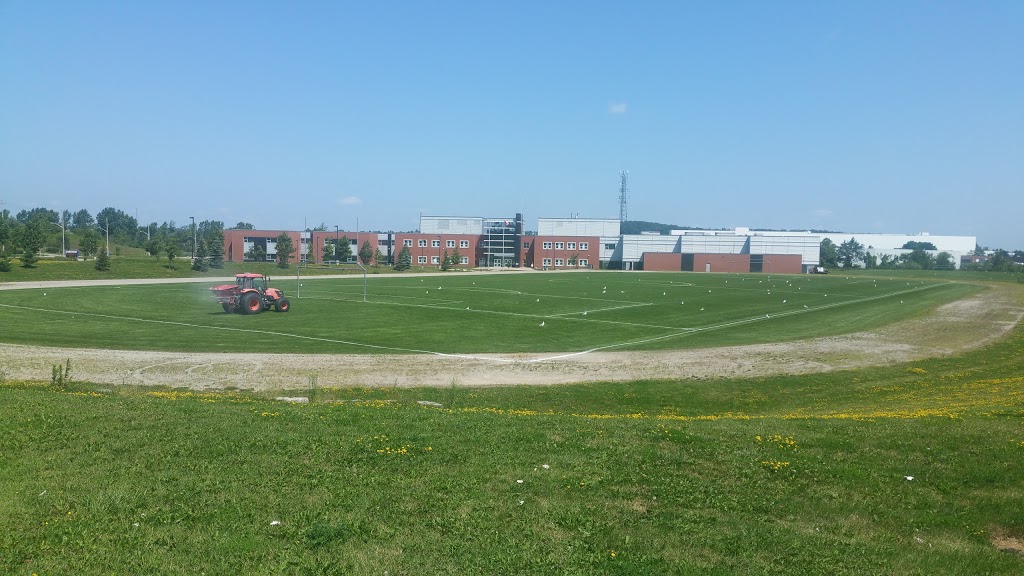Huron Heights Secondary School
(519) 896-2631
Contact and Address
| Category: | School, |
|---|---|
| Address: | 1825 Strasburg Rd, Kitchener, ON N2R 1S3, Canada |
| Postal code: | N2R 1S3 |
| Phone: | (519) 896-2631 |
| Website: | https://hrh.wrdsb.ca/ |
Location & routing
Most Recent Reviews
(October 12, 2018, 2:24 pm)Journeys are the midwives of thought. Few places are conducive to internal conversations than a moving plane,ship, or train. There is almost peculiar correlation between what is in front of our eyes and the thoughts we are able to have in our heads: large thoughts at times requiring large views, new thoughts new places. Introspective reflections which are liable to stall are helped along by the flow of the landscape. The mind may be reluctant to think properly when thinking is all it is supposed to do. The task can be as paralyzing as having to tell a joke or mimic an accent on demand. Thinking improves when parts of the mind are given other tasks, are charged with listening to music or following a line of trees. So far as you are wholly concentrated on bringing about a certain result, clearly the quicker and easier it is brought about the better. Your resolve to secure a sufficiency of food for yourself and your family will induce you to spend weary days in tilling the ground and tending livestock; but if Nature provided food and meat in abundance ready for the table, you would thank Nature for sparing you much labor and consider yourself so much the better off. An executed purpose, in short, is a transaction in which the time and energy spent on the execution are balanced against the resulting assets, and the ideal case is one in which the former approximates to zero and the latter to infinity. Purpose, then, justifies the efforts it exacts only conditionally, by their fruits. Overall, this school isn't bad. 3/5 stars.
(September 20, 2018, 3:49 pm)In life, inductive reasoning is only useful until proven false, making inductive reasoning always just a “good guess” except in the case of predicting what the afterlife will be. You cannot use deductive logic to achieve a pure answer as to what will happen when you die, from a self perspective, because you will be dead, and therefore not be able to apply any of your deductions to your life anymore, or for that matter possibly apply any knowledge anymore. Therefore, in life, you can only use induction to formulate what the afterlife might be. Consider this idea: You cannot alter the past; you can only alter the present. The fact that we accept that time moves forward warrants us to do things in our present, because we know they will affect our future. When we are born, we do not understand this, and we are living purely in the moment, with no thoughts of the future (At least for the first few moments.) However, as we age, we inductively come to the conclusion that time will continue to move forward, and our death is imminent, yet, it is a fact based on induction. As our minds order and generalize experiences, time moves faster, and we are able to concern ourselves with the future more, and we still rely on the fact that time will always move forward.By accepting in your mind that time will always move forward, you are using a very inductive path of reasoning to get to that conclusion. In all actuality, time could restart at a certain point, run in reverse, or just be playing back certain portions at random intervals for all we truly know. Therefore, if we look at the afterlife in the sense of “will I ever experience anything ever again after death?” telling those people, no you will not, would be through an inductive reasoning path as well. Science cannot prove that the afterlife doesn’t exist because even the laws of science were formulated at one point through induction, as at one point, we had no means to deduce any reasoning, and had to formulate them on our own. Therefore, couldn’t we say that induction is the only means of logic, because to use true deduction we would have to assume we know more than we don’t, which is constantly proven false. Overall, this school isn't bad. 3/5.
(September 20, 2018, 11:35 am)Isn't it funny how there's no actual proof that we exist? It was said that if a person was bound against a wall in a dark cave from birth, with a walkway behind them illuminated by a torch, then when they see shadows, they'd assume shadows are people. Their minds have not been exposed to anything and due to that, when the people walking behind the talks, they assume the shadow talks. Where is the proof that we don't suffer this fate? How can we begin to understand a concept we have never been exposed to? How do we know the bodies we walk in are indeed the vessels bound to are minds, if our conscious is truly inside of our mind, and not from somewhere else entirely? How do we truly know conscious indeed exists? If a robot is programmed to think they're someone, to answer as a person, coded to feel emotion, then how can you deny the existence of its conscience? How do we know we aren't conscience slaves, bound to the answers we respond with. If our minds can't be separated from these slaves bound to a fake mind, then how are we different? Feelings can be replicated, so where's the proof that we aren't? Everyday people wake up to greet their family, their loved ones, and pursue a life that is undeniably fake. If our lives are to live a fake life, and die a permanent death, then why do we live? We live a fake life to accomplish meaningless achievements, yet that is what separates us from any other species. Humans are born with a desire, to reach pointless fake goals in a life that isn't real. If everything we do is meaningless, then what drives us humans, slaves to our own conscience, to continue down this path of lies? I think about this a lot. Huron is a pretty good school, 3/5
Photos of Huron Heights Secondary School


